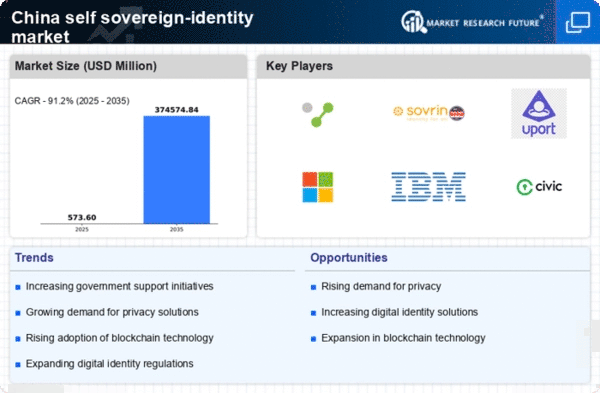Increased Focus on Data Privacy
Concerns regarding data privacy and security are driving the self sovereign-identity market in China. With rising incidents of data breaches and identity theft, consumers are becoming increasingly aware of the need to protect their personal information. This heightened awareness is prompting individuals and organizations to seek solutions that offer greater control over personal data. In 2025, surveys indicate that approximately 70% of Chinese consumers prioritize data privacy when engaging with digital services. This shift in consumer behavior is likely to propel the demand for self sovereign-identity solutions, which provide users with the ability to manage their own identities securely. Consequently, the self sovereign-identity market is expected to grow as businesses adapt to these changing consumer expectations and regulatory requirements.
Government Initiatives and Investments
The Chinese government is actively promoting the development of self sovereign-identity solutions through various initiatives and investments. Recognizing the importance of digital identity in fostering economic growth and enhancing security, the government has allocated substantial resources to support research and development in this area. In 2025, government funding for identity management technologies is projected to exceed $500 million, aimed at creating a robust infrastructure for self sovereign-identity systems. This support not only encourages innovation but also facilitates collaboration between public and private sectors, thereby accelerating the adoption of self sovereign-identity solutions. As a result, the self sovereign-identity market is likely to benefit from enhanced credibility and trust, positioning it as a critical component of China's digital economy.
Growing E-commerce and Digital Services
The rapid expansion of e-commerce and digital services in China is a key driver of the self sovereign-identity market. As online transactions become more prevalent, the need for secure identity verification mechanisms is paramount. In 2025, the e-commerce sector in China is projected to surpass $2 trillion, creating a substantial demand for reliable identity solutions. This growth is prompting businesses to adopt self sovereign-identity systems that enhance customer trust and streamline the onboarding process. Furthermore, the increasing reliance on digital services across various industries necessitates robust identity management solutions. Consequently, the self sovereign-identity market is likely to thrive as organizations seek to meet the evolving demands of consumers in a digital-first economy.
Technological Advancements in Blockchain
Technological advancements, particularly in blockchain technology, are significantly influencing the self sovereign-identity market in China. Blockchain offers a decentralized and secure framework for identity management, enabling individuals to maintain control over their personal data. In 2025, it is anticipated that blockchain-based identity solutions will account for over 40% of the self sovereign-identity market. This shift is driven by the technology's ability to enhance security, reduce fraud, and streamline verification processes. As organizations increasingly adopt blockchain for identity management, the self sovereign-identity market is likely to witness accelerated growth, fostering innovation and collaboration among stakeholders. The integration of blockchain technology is expected to redefine how identities are managed and verified in the digital landscape.
Rising Demand for Digital Identity Solutions
The self sovereign-identity market in China is experiencing a notable surge in demand for digital identity solutions. This trend is driven by the increasing digitization of services across various sectors, including finance, healthcare, and e-commerce. As more citizens engage with online platforms, the need for secure and efficient identity verification processes becomes paramount. In 2025, it is estimated that the digital identity market in China could reach a valuation of approximately $10 billion, reflecting a compound annual growth rate (CAGR) of around 20%. This growth indicates a strong inclination towards adopting self sovereign-identity solutions that empower individuals to control their personal data while ensuring compliance with regulatory standards. Consequently, the self sovereign-identity market is poised to expand significantly as organizations seek to enhance user trust and streamline operations.
















